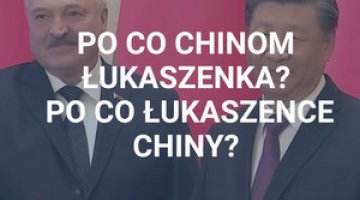Painful EU sectoral sanctions against Belarus
On 25 June, another package of EU sanctions against Belarus, related to the Minsk regime’s serious violations of human rights, came into force. In contrast to the previous restrictions, including those of 21 June concerning persons and legal entities supporting Lukashenka, this time the restrictions were targeted at selected economic sectors and trade in selected groups of goods. The sanctions mainly concern the import into the EU of petroleum products, fertilisers and certain categories of potassium chloride, as well as the transit of these goods through the member states’ territories. In addition, the sale of tobacco products to Belarus, the supply of dual-use products used by the armaments industry, and the sale of remote surveillance technologies were banned.
Significant restrictions have been introduced on Belarus’s access to the EU financial market; for example, the European Investment Bank’s financing of projects intended for Belarusian state-owned entities has been prohibited; all technical assistance and trading in debt securities with the largest state-owned banks (Belarusbank, Belinvestbank and Belagroprombank, which together control 60% of the local banking sector’s assets) will be suspended; and Belarusian state-owned entities will be forbidden from obtaining banking and investment guarantees. The EU countries also undertook to reduce the involvement in Belarus of the international banking institutions to which they belong.
Commentary
- By introducing sectoral sanctions against Minsk for the first time in its history, the European Union is directly targeting Belarus’s most profitable areas of export. In 2020, the value of sales of petroleum products from this country to the EU amounted to around US$500 million, and a year earlier, when there were no problems with the supply of petroleum to Belarusian refineries from Russia, the figure reached US$679 million (Belarus’s total exports of this group of goods amounted to US$2.7 billion last year, i.e. just over half the 2019 figure). In turn, the value of its potassium chloride supplies to the EU in 2020 stands at around US$200 million. As a result, the direct and indirect effects of the sanctions introduced on 21 and 24 June will seriously reduce Belarus’s export revenues (by up to 10%), significantly worsen its trade balance, and negatively affect the current scale of production in its industrial plants.
- The restrictions will complicate the situation in the petroleum products manufacturing sector in particular. It will be difficult for Belarusian refineries to find alternative sales markets, and it is also doubtful that they will find sales in Russia, Lukashenka’s key political and economic partner. First of all, the sanctions hare targeted at Naftan in Novopolatsk, whose situation was already complicated by the imposition of US sanctions on it and the suspension of gas supplies by Russian contractors for the third quarter of this year. If the United Kingdom and Ukraine decide to join the fuel import ban, this will be of great importance for the state of the Belarusian petrochemical sector. In 2019, both countries purchased fuel from Belarus in the amounts of US$2.14 billion and US$2 billion respectively; however, it seems at present that Kyiv is unlikely to make such a move.
- Restricting the export of potassium chloride will not cause long-term disruption to Belaruskaliy, whose production is mainly targeted at Brazil, India and China; the company will try to gain new sales markets in other regions of the world. As for the export of nitrogen fertilisers, the sanctions will primarily hit Azot in Hrodna, which sells part of its production to Europe. At the same time, it is possible that fertiliser exports will have to be redirected from the port of Klaipėda in Lithuania to Russian ports (as was the case with some Belarusian petroleum products in February), which will reduce their profitability.
- The restrictions on state-owned banks will hit the Belarusian economic system hard, but at the present stage it is difficult to assess what this action’s long-term effects will be. It will definitely limit Belarus’s access to capital, and – in combination with the other restrictions imposed on the local financial sector – cut the country off from the possibility of obtaining loans in the EU and prevent it from selling Eurobonds; this in turn will result in difficulties with debt refinancing. The suspension of the financing of development programs by the European Investment Bank will also be a serious blow for the country: it is currently running eight lines of credit for infrastructure projects with a total value of US$550 million.
- As cigarettes are notoriously smuggled into the European Union, the impact on the tobacco industry is less painful. However, the ban on the export of machinery to produce cigarettes and their packaging may affect the volume of their production and reduce revenues from smuggling.
- It should also be expected that after some time the regime will find a way to at least partially circumvent the sanctions on oil products, as was the case after the rigged presidential elections in 2010. This will most likely be achieved by redirecting their exports through a chain of intermediaries in other countries.
- The Belarusian authorities were aware that EU sanctions could be tightened even further. At the same time, however, they did not reckon with the fact that as a consequence the country’s economic relations with Russia would become even deeper. However, they did not decide to ease the rigours of the authoritarian state, considering that it would be dangerous to Lukashenka’s autocratic rule. Minsk’s reaction to the EU’s restrictions boils down to presenting them as a deliberately planned “trade war” aimed at worsening the public’s living standards and destabilising the internal situation. On the eve of the restrictions, Lukashenka insisted that the authorities would take all necessary steps to maintain the current level of industrial production. He did not rule out the introduction of ‘martial law’ in the economy, which may mean that industrial plants are taken over by representatives of the ministries of force. He also announced retaliatory measures, suggesting that these would be associated with permitting increased smuggling and illegal migration to EU countries. In turn, Prime Minister Raman Halouchenka threatened that the authorities in Minsk would consider the possibility of restricting the operation of EU companies in Belarus. At the same time, in a statement on 25 June, the Ministry of Foreign Affairs announced the implementation of counter-sanctions in the near future, but did not specify their nature.
- The introduction of the new sanctions on Belarus has met with an official reaction from Moscow, which has deemed the EU’s actions unlawful. On 23 June Maria Zakharova, the spokeswoman for the Russian Ministry of Foreign Affairs, stated that Russia expresses its solidarity with Minsk’s position, and was treating the sanctions as an example of interference in the internal affairs of the state. The Russian Federation’s ambassador in Minsk, Yevgeny Lukyanov, expressed great sentiment in stating that Russia would never abandon Belarus and would support it in difficult times. Nevertheless, these emotional declarations did not contain any announcements of specific relief measures. Most likely, Russia’s offer of support for its neighbour will include the temporary and selective opening of its domestic market to the products under sanction; this will be used to accelerate the processes of the two states’ economic integration, or even as a pretext for open takeovers of the local enterprises, although Lukashenka will resist such steps.




